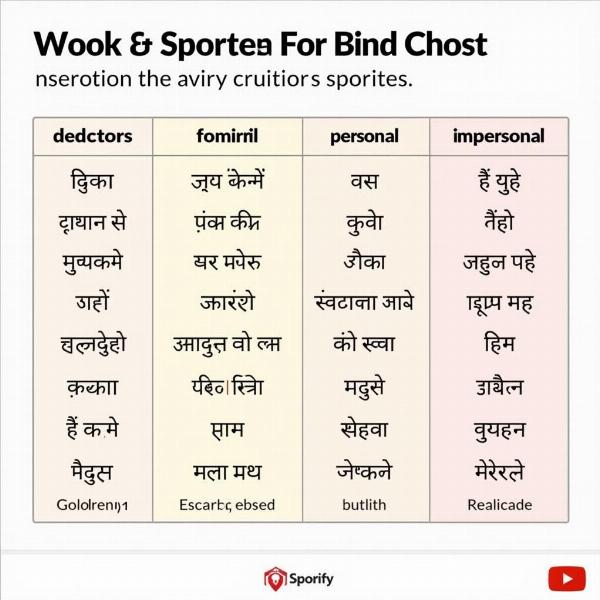Detractors meaning in Hindi encompasses various terms that convey the sense of criticism, opposition, or disapproval. Understanding the nuances of these terms is crucial for navigating social, professional, and cultural contexts in India. This article explores the different ways to express the idea of “detractors” in Hindi, along with their cultural implications and practical usage.
Different Ways to Say “Detractors” in Hindi
Several Hindi words can be used to translate “detractors,” each with its own shade of meaning. Some common options include:
- विरोधी (virodhi): This is the most common and direct translation, meaning “opponent” or “adversary.” It signifies someone who actively opposes or resists something.
- आलोचक (aalochak): This term refers to a “critic,” someone who evaluates and judges something, often negatively. It implies a more formal or intellectual form of opposition.
- निंदक (nindak): This word describes someone who “criticizes” or “condemns,” often with a negative connotation. It suggests a harsher form of disapproval than आलोचक.
- बदख्वाह (badkhah): Meaning “ill-wisher,” this term describes someone who wishes harm or misfortune upon another. It implies a more malicious intent than simply disagreeing.
- दुश्मन (dushman): This strong word translates to “enemy,” signifying open hostility and antagonism. It represents the most extreme form of opposition.
Understanding the Cultural Context
In Indian culture, maintaining social harmony is highly valued. Direct confrontation or open criticism can be considered disrespectful or even aggressive. Therefore, the choice of words to describe detractors is often influenced by the context and the relationship between the parties involved. Using a milder term like आलोचक might be more appropriate in a formal setting, while बदख्वाह might be used to describe someone with whom there is a personal conflict.
Dealing with Detractors in India
Navigating criticism and opposition requires tact and sensitivity. The Indian approach often emphasizes finding common ground and resolving differences through dialogue and compromise. Directly confronting detractors might be seen as counterproductive, while ignoring them completely could also be interpreted negatively. Finding the right balance is crucial.
Practical Examples and Usage
- Political Context: “The government’s policies faced strong opposition from its विरोधियों (virodhis).”
- Literary Context: “The book received mixed reviews from literary आलोचकों (aalochaks).”
- Personal Context: “He believed he had many बदख्वाह (badkhah) who were jealous of his success.”
How to Choose the Right Word
The specific word you use to describe detractors in Hindi depends on the context and the intensity of the opposition. Consider the following:
- Formal vs. Informal: आलोचक is more formal than निंदक.
- Intensity of Opposition: दुश्मन signifies a much stronger opposition than विरोधी.
- Personal vs. Impersonal: बदख्वाह suggests a personal animosity, while विरोधी can be more impersonal.
 Choosing the Appropriate Hindi Word for Detractors
Choosing the Appropriate Hindi Word for Detractors
Conclusion
Understanding the various terms for “detractors” in Hindi provides valuable insights into Indian culture and communication styles. By choosing your words carefully, you can navigate potentially sensitive situations with greater effectiveness and respect. Learning the nuances of these terms will enhance your understanding of Hindi and empower you to communicate more precisely in various contexts.
FAQs
- What is the most common Hindi word for “detractor”? विरोधी (virodhi) is the most common and general term.
- What is the difference between आलोचक and निंदक? आलोचक implies more formal criticism, while निंदक suggests harsher condemnation.
- When should I use the word दुश्मन? दुश्मन should be reserved for situations of open hostility and enmity.
- How can I deal with detractors in an Indian context? Focus on dialogue, compromise, and finding common ground.
- Why is it important to choose the right word for “detractor”? Using the appropriate word demonstrates sensitivity and respect for cultural nuances.
- Is it considered rude to directly confront detractors in India? Direct confrontation can be considered disrespectful in many situations.
- What are some other ways to express disapproval in Hindi? Other terms include अस्वीकृति (asweekriti – disapproval), आपत्ति (aapatti – objection), and विरोध (virodh – protest).
Meaning-Hindi.in offers professional translation services specializing in Hindi and various other languages. We cater to diverse needs, including business and commercial document translation, certified and legal document translation, technical and user manual translation, website and localization services, educational and academic translation, and expedited translation services. Our expertise encompasses various specialized fields. Contact us for accurate and culturally sensitive translations. Email: [email protected], Phone: +91 11-4502-7584. For more information, visit Meaning-Hindi.in.